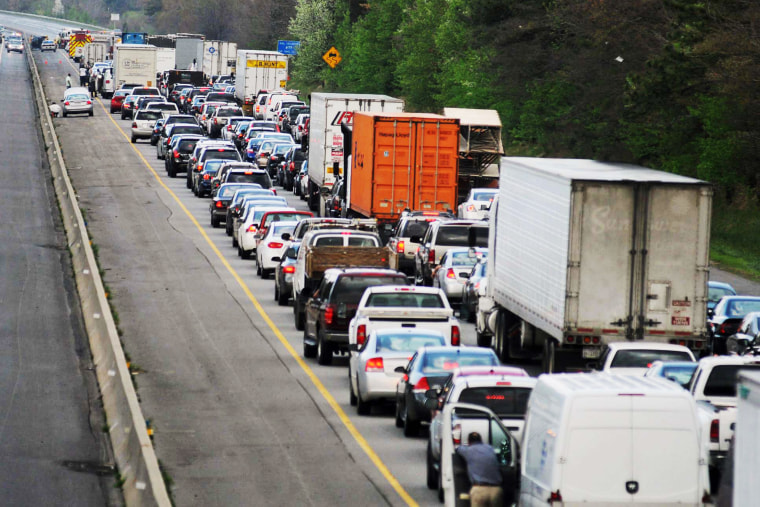Interstate 95 is already one of the most congested roads in the country. Now congressional gridlock means Americans could be stuck in traffic for even longer.
Unless Congress acts, the federal Highway Trust Fund will run out of money by the end of September, which risks stopping or slowing infrastructure projects across the country and keeping new ones from getting off the ground. And that means more frustration, wasted gas, and potential accidents for the nation's drivers.
Delaware, for example, has been hoping for years to fix the interchange between I-95 and State Route 141, just south of Wilmington and north of New Castle Airport. Congestion is awful during rush hour as drivers navigate the curved ramps on and off the highway.
Right now, traffic is even worse: This week, a major bridge nearby closed indefinitely after it began to tilt and crack—and I-95 is the main detour.
"Tens of thousands of commuters are forced onto already crowded streets and highways, creating even worse traffic for everyone in our area, hurting our economy, and taking people away from where they need to be," Sen. Chris Coons, a Delaware Democrat said Thursday on the Senate floor after the bridge closure.
The spot has also historically had a high number of accidents, according to the state's Department of Transportation, making it a priority for safety improvements. "These crashes can be attributed to congestion, red light running and the geometry of the interchange ramps," a 2010 analysis concluded. Some have even been fatal: A 19-year-old Wilmington woman was killed in early 2012 when her Subaru collided with a concrete barrier at the SR 141 interchange.
But Delaware might not be able to move forward with its plans to revamp the hazardous spot unless Congress acts: It's among the infrastructure projects that will be put on ice unless Washington finds more money for the federal Highway Trust Fund—or the state finds some way to make up the gap.
The federal fund for road, bridge, and transit improvements will run dry by the end of September, jeopardizing similar projects across the country. It needs $15 billion just to stay afloat through Fiscal Year of 2015, and $172 billion over the next decade, according to the Congressional Budget Office. It's not the first time that Congress has approached the "highway cliff": The fund has been on life support for years, as revenue from the gas tax meant to pay for these projects hasn't kept up with the country's infrastructure needs.
In response, Sen. Tom Carper (D-Del.) is pushing for an increase in the federal gas tax, which Congress hasn't raised since 1993. House Republicans want to use revenue from ending U.S. Postal Service delivery on Saturdays to prop up the fund. Others have proposed revamping the funding structure entirely through mileage fees or a more decentralized funding system.
But in an election year, no one on Capitol Hill is expecting Congress to fix the long-term problem. At most, legislators are expected to scrape together yet another stopgap bill and continued uncertainty.
"Everyone’s in favor of better infrastructure and better highways," said John Grieshaber, a state lobbyist for the American Society of Civil Engineers in Delaware. However, he added, "nobody wants to be the bad guy — nobody wants to be the person that’s ultimately responsible for raising taxes."
States have tried to scrape together their own funds to address the shortfall. Delaware's governor, for instance, is proposing a state-level gas tax hike. But it's not enough to make up for the federal role in fixing the I-95 interchange: Washington usually pays for 80 to 90 percent of federally supported highway work.
Congress does manage to find money for infrastructure in a crisis: Federal officials quickly approved $2 million in emergency aid to fix the tilting bridge, drawing from a reserve that's separate from the Highway Trust Fund. But when it comes to long-term planning, the urgency for action disappears.
"It is sadly just yet another example, one that hits particularly close to home for me, in a string of major infrastructure emergencies, some due to unforeseeable events and some due to a long-term critical lack of investment, that signify why investment in our infrastructure is so important," Coons said.
